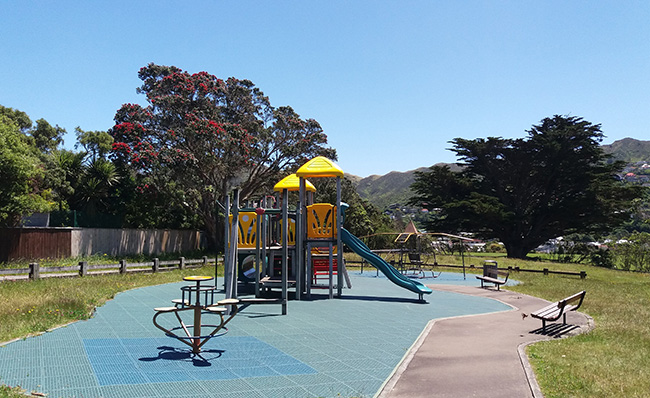 Tuesday 9 January 2018 4:51pm
Tuesday 9 January 2018 4:51pm
New research from University of Otago Wellington has found that many of the region's playgrounds lack sufficient shade from the sun.
Children visiting playgrounds this summer may be at high risk of sunburn, according to a new study from the University of Otago, Wellington.
The researchers looked at shade cover in 50 playgrounds in the Wellington region between January and February 2017, and found that 95 per cent of play equipment and 65 per cent of seats/tables had no shade cover.
Average shade cover was approximately a quarter of that found in Australian playgrounds, where trees and built shade over playgrounds are more common.
Lead researcher Ryan Gage, says the study highlights the need for children and their parents to ensure they are protected from the sun this summer.

Lead researcher Ryan Gage from the University of Otago Wellington.
“At this time of year between 10am and 4pm, the sun is strong enough to cause skin damage,” says Mr Gage.
“We found that Wellington playgrounds have insufficient shade available. Increased shade is urgently needed to protect children from harmful ultraviolet radiation (UVR) exposure, by planting trees with heavy foliage and building structures with large, protective roofing.”
The researchers used a Solarmeter to calculate the proportion of UVR blocked by each built structure and tree.
“Our study shows that many children in playgrounds are in full exposure to the sun. This puts them at risk of sunburn and skin cancer if they are not wearing sunscreen and/ or protective clothing.”
“Providing effective shade in summer recreation spaces may help to reduce children's risk of skin cancer,” says Gage.
New Zealanders are at the highest risk of melanoma skin cancer in the world. Each year, nearly 70,000 skin cancers are diagnosed and 500 New Zealanders die from skin cancer.
The researchers stress the importance for Kiwis to follow the SunSmart advice: “slip on a shirt with long sleeves, slop on some sunscreen (about 1 teaspoon to each arm and leg), slap on a wide-brim hat and wrap on close-fitting sunglasses,” when outdoors this summer, and to seek shade when it is available.
“Approximately 90 per cent of skin cancers are linked with excessive sun exposure. Forming lifelong sun protection habits is crucial for preventing skin cancer,” says Gage.
The research was published in the journal Photochemistry and Photobiology.
For further information or a copy of the paper, contact:
Mr Ryan Gage
Department of Public Health
University of Otago, Wellington
Email: ryan.gage@otago.ac.nz
A list of Otago experts available for media comment is available elsewhere on this website.
Electronic addresses (including email accounts, instant messaging services, or telephone accounts) published on this page are for the sole purpose of contact with the individuals concerned, in their capacity as officers, employees or students of the University of Otago, or their respective organisation. Publication of any such electronic address is not to be taken as consent to receive unsolicited commercial electronic messages by the address holder.